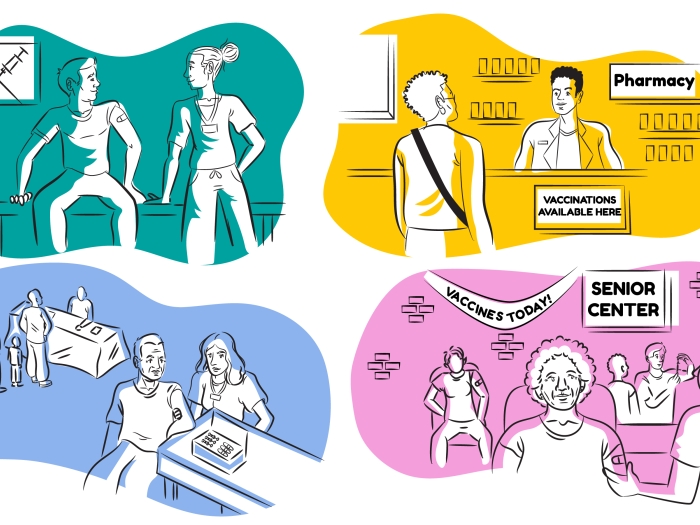Hepatitis C affects a disproportionate number of older Americans. A U-M strategy is helping them get tested.
1:00 PM
Author |

Baby boomers, adults born between 1946 and 1964, are five times more likely to have been exposed to the hepatitis C virus (HCV).
SEE ALSO: The Landscape for Hepatitis C Is Changing
As a result, the Centers for Disease Control and Prevention and the U.S. Preventive Service Task Force recommend that all patients in that age group get tested.
But the simple blood test, designed to detect and prevent illness before the virus wreaks havoc, is infrequently performed on baby boomers whose routine medical appointments are often crammed with other preventive measures and tests — as well as time spent addressing active problems that require a doctor's immediate attention.
Investigators at the University of Michigan Health System recently found an easy way to help primary care physicians ensure that an HCV screening is part of the routine: electronic medical record alerts.
The automated alert, programmed to appear if a patient was within the at-risk age range, reminds doctors not only to issue the test but also provide educational materials about the virus.
Implemented in fall 2015 in primary care clinics throughout the U-M health system, the strategy contributed to a significant rise in screenings — an eightfold boost — in the first six months alone.
"A large part of the success was figuring out how to take the logistical work away, which involves more than looking at a patient's date of birth," says Monica Konerman, M.D., M.Sc., a hepatologist at the University of Michigan who treats patients facing the prospect of hepatitis damaging their liver.
A population in need
It isn't entirely clear why hepatitis C rates are higher in baby boomers — although many, according to the CDC, are believed to have become infected during the 1970s and 80s when rates were highest (and before screenings of donated blood and organs became available in 1992).
Hepatitis C, likewise, can be asymptomatic for decades. Many patients could have been exposed to risk factors years ago but never sought testing or treatment.
A universal one-time HCV screening based on age, then, can bypass the discomfort of having to talk about potentially embarrassing topics such as prior drug use or sharing needles.
It also helps democratize preventive care. Prior to launching the alert, HCV screening was higher in men, Asian- and African-Americans, and in patients with Medicaid insurance. Screening rates also varied greatly by clinic site (ranging from 20 to 32 percent).
After the alert was adopted, however, screenings increased equally among genders, races, insurance plans and UMHS clinic sites.
Why screening matters
The screening test for hepatitis C is the virus antibody. If the hepatitis C antibody is detected, a confirmation test for the virus' RNA (genetic material) is recommended to confirm chronic infection.
SEE ALSO: Early Detection, Early Treatment for Hepatitis C
Of the 16,773 baby boomers targeted for screening via electronic alert at UMHS, fewer than 1 percent tested positive for the hepatitis C antibody.
Despite that low rate, the alert system nonetheless helped identify people who would benefit from curative hepatitis C treatment, says Konerman, who presented the findings in May at the Digestive Disease Week conference in San Diego.
After all, a new era in hepatitis treatment began in 2013 with the approval of interferon-free oral combination therapy that was demonstrated in clinical studies led by U-M to cure hepatitis C in 95 percent of patients. If treated and the body responds, patients can get rid of the virus before liver damage and liver failure occur.
Which is why the new alert technology is crucial for a population that could benefit most from HCV screening.
"The availability of direct-acting antiviral agents has been a game-changer," says Konerman. "Previously, many providers thought screening had low utility: (that) the treatment was terrible and didn't work well. Today, short courses of all oral treatments are highly effective and can prevent progressive liver disease."

Explore a variety of health care news & stories by visiting the Health Lab home page for more articles.

Department of Communication at Michigan Medicine
Want top health & research news weekly? Sign up for Health Lab’s newsletters today!





